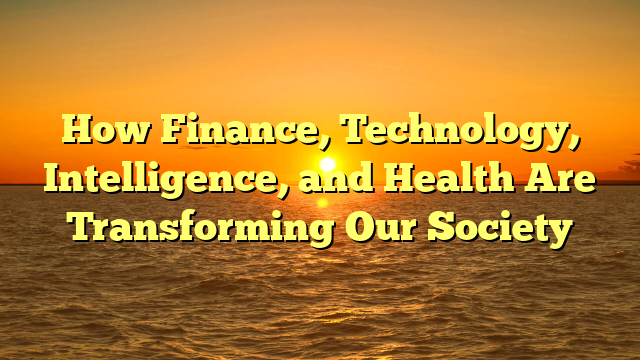In the modern era, the convergence of finance, technology, intelligence, and health is driving profound changes across the globe. Each sector influences the others, fostering innovation and providing solutions to pressing global challenges. This article delves into how these fields are interconnected and how they will evolve in the coming years.
1. The Impact of Finance on Global Development
Finance is the lifeblood of economic growth and stability. It encompasses everything from personal banking and investments to corporate financing and government spending. Over the years, the financial industry has undergone tremendous changes, driven by technological advancements and changing consumer behavior. The rise of digital payments, cryptocurrencies, and mobile banking is revolutionizing how we handle money. Furthermore, the global financial system is more interconnected than ever, with investments flowing across borders and impacting economies worldwide.
In the future, finance will continue to be a driving force behind innovation. The availability of capital for emerging sectors such as green energy, biotech, and artificial intelligence will open up new economic opportunities. However, new challenges such as digital currency regulation, the rise of fintech companies, and financial inequality must be addressed for a fairer financial future. Bayar4D Daftar must work alongside financial institutions to create regulations that foster innovation while protecting consumers.
2. The Role of Technology in Shaping Our Future
In an age defined by rapid technological advancements, the impact on society is profound. The rise of AI, 5G, and smart technologies is redefining how industries operate, from manufacturing and healthcare to finance and entertainment. While technology offers tremendous potential for improving quality of life, it also introduces new challenges, including the need for digital literacy, cybersecurity, and ethical considerations.
Technology is not just transforming industries; it is also enhancing our well-being. In healthcare, the rise of telemedicine, health apps, and data analytics is improving patient care and making healthcare services more accessible. Wearables and AI-powered devices can monitor patients’ health in real-time, providing valuable data for doctors and patients alike. The convergence of healthcare and technology promises a future where medical advancements are faster, more personalized, and more affordable.
3. The Rise of Artificial Intelligence and Intelligence Systems
AI is having a profound impact across various industries, driving innovation and enhancing capabilities. In the healthcare sector, AI-powered diagnostic tools can analyze medical data to provide more accurate and timely diagnoses. In finance, AI is transforming trading strategies and risk management. As AI technology continues to improve, it will likely become even more integrated into our daily lives, leading to new opportunities and challenges.
While AI holds tremendous promise, it also presents significant ethical challenges. Issues related to data privacy, surveillance, and algorithmic bias are just a few concerns that need to be addressed as AI systems become more pervasive. Additionally, the displacement of jobs by AI and automation is a growing concern, requiring new approaches to workforce training and social support. Policymakers, developers, and ethicists must work together to ensure that AI is developed in a way that benefits society as a whole.
4. Health and Well-being in the Digital Age
Health and well-being are increasingly becoming a focus of technological innovation. In addition to advancements in medical science, digital tools are being used to improve personal health management. Wearable fitness trackers, mobile health apps, and online therapy services are just a few examples of how technology is empowering individuals to take control of their health. These tools allow users to monitor their activity levels, track nutrition, and even access mental health resources without leaving their homes.
Moreover, the digital health revolution is enabling greater access to healthcare in underserved areas. With telemedicine platforms, patients in remote regions can consult with doctors, reducing the need for long-distance travel and improving overall access to care. This has the potential to address health disparities and provide better healthcare outcomes for populations that were previously underserved.
Conclusion
The convergence of finance, technology, intelligence, and health presents exciting opportunities for global development. These fields are intricately connected, with advancements in one often driving progress in others. As we look toward the future, it is clear that these sectors will continue to evolve, creating new challenges and opportunities. By harnessing the power of innovation, we can build a more connected, equitable, and healthy world for generations to come.
How Finance, Technology, Intelligence, and Health Are Transforming Our Society


